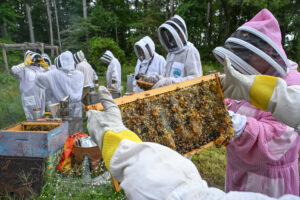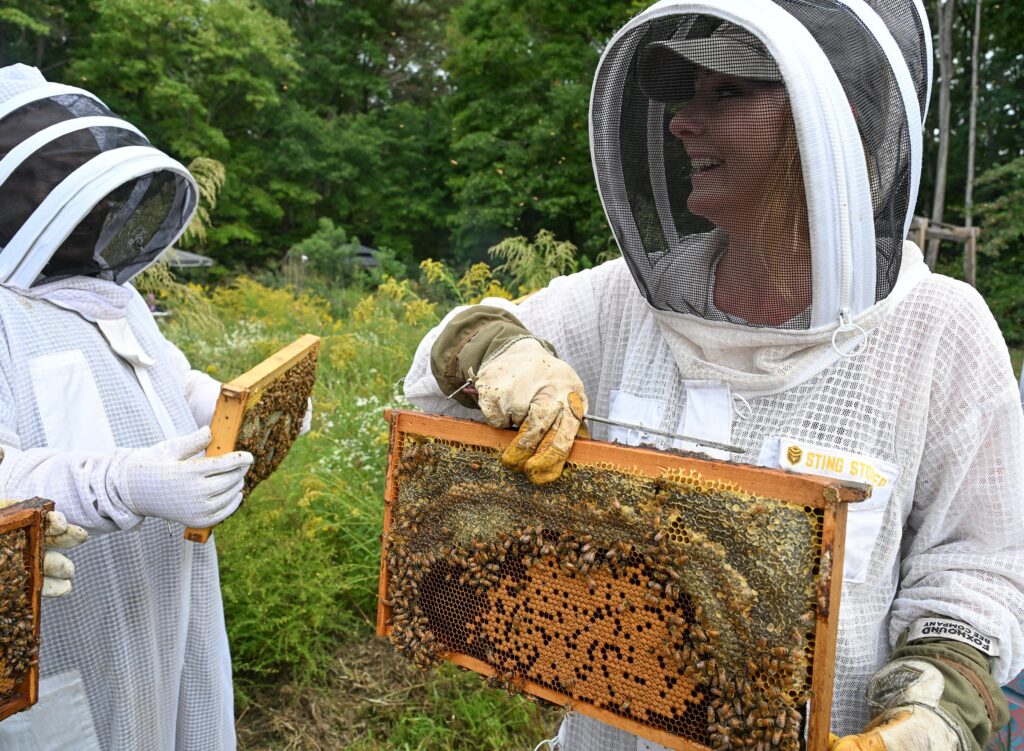
For some, it’s hearing bees buzz in the calming key of C while walking among the hives or being lulled to sleep in a loft above an apiary. For others, it’s collecting eggs from a chicken coop and picking veggies fresh from the garden to make a meal after a day on the farm, brushing and feeding the goats and donkeys, and even helping clean their stalls.
“People have lost the hands-on, feet-in-the-earth knowledge,” said Lauren Pascarella (right), who owns BayBees Honey LLC in Whaleyville, Maryland, with her husband, Fred Kelly.
She and like-minded agritourism operators like those highlighted during UMES Extension’s latest traveling workshop are giving tourists an education through experience on where their food comes from.
What started in Pascarella’s backyard as a hobby and side income, “blew up during COVID,” with people wanting outdoor excursions and entertainment. They now offer arranged educational visits to the apiary, which supplements their main income from pollination services for customers as varied as big crop farmers to homesteaders. Their honey products are also sold at off-site markets.
The public’s interest has continued and sparked an upswing in agritourism in the state of Maryland, benefitting consumers, the agricultural community and local economies. UMES’ agritourism program is geared toward helping these groups connect through events, including the Maryland Agritourism Conference, the Traveling Agritourism Workshop series and other training and networking opportunities.
What is agritourism?
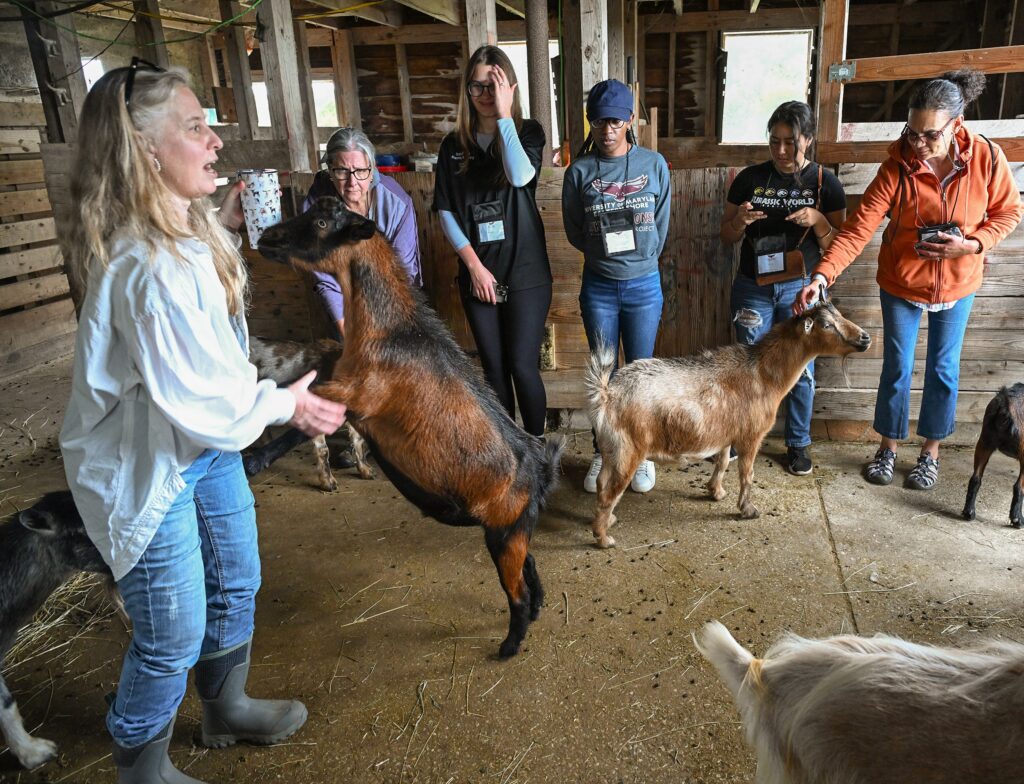
“Agritourism is about getting feet on the farm,” said Dana Zucker (far left). She and her husband, David, relocated from Nebraska to the Clifton Estate on the banks of the Manokin River in Westover, Maryland. The Clifton, their private residence, was built in 1804 on property with the highest point in Somerset County.
The Zuckers offer a farm bed-and-breakfast experience at Sugar Water Manor in two restored farmhouses. Recently, they made the leap to adding the historic Washington Inn and Tavern to their suite of businesses. Returning to the previous name, Washington Hotel, it showcases their farm- and water-to-table restaurant, Sugar Water.
The hotel, she said, is a diversification of their agritourism ventures.
“Our farm stay guests need a place to eat, and our hotel guests are looking for experiences at our farm and places in the area. We’re getting feet on others’ farms,” the enterprising small farmer said.
Making mutually beneficial connections
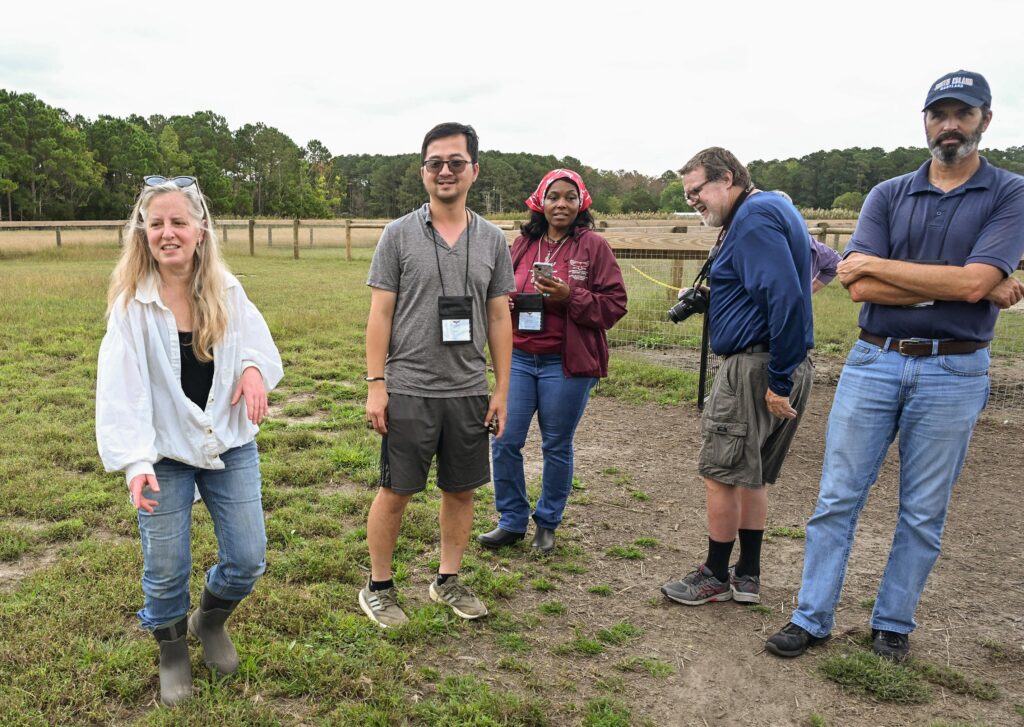
That’s what UMES agritourism initiatives are all about: connecting agricultural producers interested in enhancing their income streams with each other to share first-hand their successes and challenges, said Dr. Prem Bhandari, the agritourism and value-added agricultural marketing specialist with UMES Extension.
Everette Landon (far right), who was wearing two hats for the day as owner of Experience Smith Island and an assistant with the Somerset County Tourism Office, was taking it all in.
Born and raised on the island, he spent years on the water as a local crabber before turning his attention to educating people on the history and way of life on Smith Island. What started as a hobby three years ago has morphed into a “full-blown business” over the past year.
“This tour has helped me better understand the business end of things, like set up, taxes, insurance, finance and general ideas about what to offer customers,” Landon said. “All of the information I’ve gotten today helps me in the next steps to take.”
Learning from others
Zucker’s first piece of advice: “Setting a business plan in place is the key to anything you do. Then go be an entrepreneur! You have to have a five-year plan for diversified revenue and know your expenses.”
She also suggests consulting an experienced certified public accountant, banker and other professionals to “set yourself up for success in the best possible way.” Different arms of the business, for example, might be split for liability, tax and zoning classification, rather than a farm being one entity.
Pascarella joined her in bringing home the “know your liability and the legalities” of your operation.
“Protect yourself, the building, the land you own and your employees. There are layers of protection that you need that an insurance agent can advise you on,” Zucker said.
Another tip: “Know your market and market to your market!”
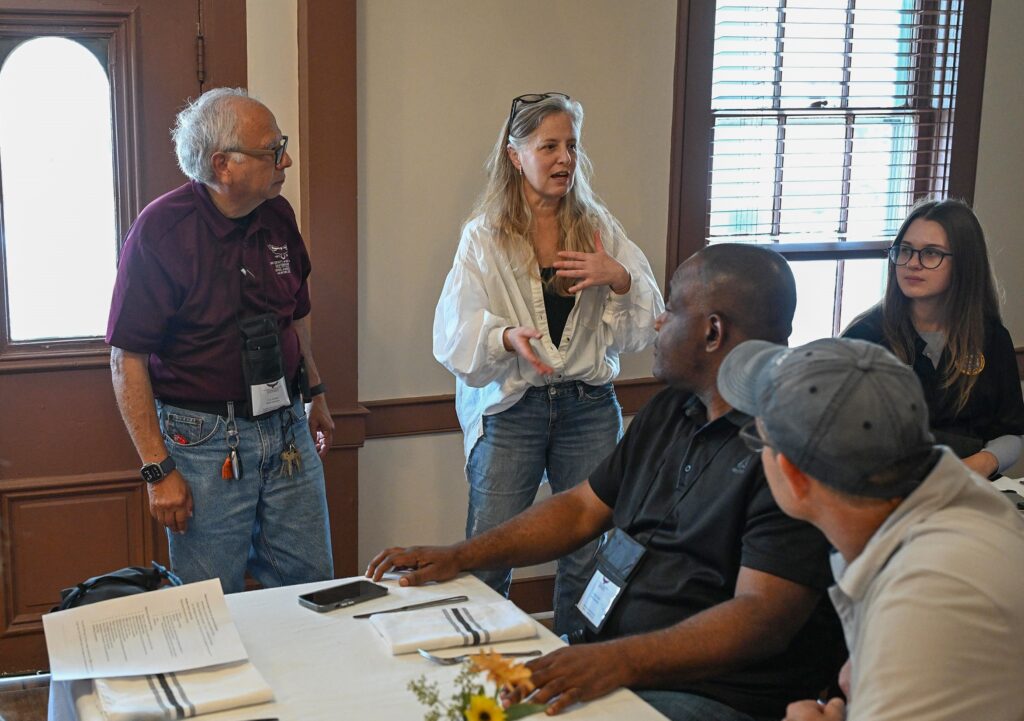
Giving tourism something to shout about
Agritourism events not only show operators what others are doing, they also provide an avenue for local tourism agencies to get a glimpse of agribusinesses they can help promote to attract people to their towns and counties.
“It’s important to be involved in these events to explore ways the town can work with UMES and discover how to make Princess Anne attractive through agritourism,” said Izabell Wilk (pictured far right, at left), the new town planner.
Landon seconded the thought, saying: “When you experience first-hand what is here in the county, you are better able to share what we can offer tourists.”
Agritourism boosts the local economy
Our employees are mainly from Somerset County, Zucker said. The 10-room hotel has a UMES intern from the Hospitality and Tourism Management Program who works and lives there for room and board, and a stipend. He’s getting a variety of experiences, like managing the Airbnb listing and communication, social media and working on special events. Also, horticulture students are employed on the farm.
“Now that we’ve built a network, it’s easier to hire locally through word of mouth,” she said.
Fair wages, diverse experiences and accommodating workers’ schedules is a must, she pointed out.
Creating a network also allows agritourism operators to bundle their services or cooperatively market each other’s services. By helping each other get the word out, it also allows farmers to spend less on advertising. For example, Zucker has teamed up with local organizations being open for a fundraising garden tour.
“What I give, gives back to me in other ways,” she said.
On the walk back to the bus from the tour, Zucker and Landon struck up a conversation about each other’s businesses being close in proximity and a light went off. Perhaps, guests might like a boat ride over to learn about Smith Island?
“We’ll have to talk more,” Zucker said.
Gail Stephens, agricultural communications and media associate, University of Maryland Eastern Shore, School of Agricultural and Natural Sciences, UMES Extension, gcstephens@umes.edu., 410-621-3850.
Photo by Todd Dudek, agricultural communications, University of Maryland Eastern Shore, School of Agricultural and Natural Sciences, UMES Extension, tdudek@umes.edu.
